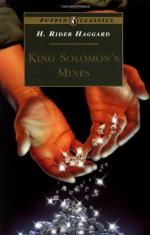There was no longer any doubt about the matter, which for my own part I confess perfectly appalled me. There he sat, the dead man, whose directions, written some ten generations ago, had led us to this spot. Here in my own hand was the rude pen with which he had written them, and about his neck hung the crucifix that his dying lips had kissed. Gazing at him, my imagination could reconstruct the last scene of the drama, the traveller dying of cold and starvation, yet striving to convey to the world the great secret which he had discovered:—the awful loneliness of his death, of which the evidence sat before us. It even seemed to me that I could trace in his strongly-marked features a likeness to those of my poor friend Silvestre his descendant, who had died twenty years before in my arms, but perhaps that was fancy. At any rate, there he sat, a sad memento of the fate that so often overtakes those who would penetrate into the unknown; and there doubtless he will still sit, crowned with the dread majesty of death, for centuries yet unborn, to startle the eyes of wanderers like ourselves, if ever any such should come again to invade his loneliness. The thing overpowered us, already almost perished as we were with cold and hunger.
“Let us go,” said Sir Henry in a low voice; “stay, we will give him a companion,” and lifting up the dead body of the Hottentot Ventvoegel, he placed it near to that of the old Dom. Then he stooped, and with a jerk broke the rotten string of the crucifix which hung round da Silvestra’s neck, for his fingers were too cold to attempt to unfasten it. I believe that he has it still. I took the bone pen, and it is before me as I write—sometimes I use it to sign my name.
Then leaving these two, the proud white man of a past age, and the poor Hottentot, to keep their eternal vigil in the midst of the eternal snows, we crept out of the cave into the welcome sunshine and resumed our path, wondering in our hearts how many hours it would be before we were even as they are.
When we had walked about half a mile we came to the edge of the plateau, for the nipple of the mountain does not rise out of its exact centre, though from the desert side it had seemed to do so. What lay below us we could not see, for the landscape was wreathed in billows of morning fog. Presently, however, the higher layers of mist cleared a little, and revealed, at the end of a long slope of snow, a patch of green grass, some five hundred yards beneath us, through which a stream was running. Nor was this all. By the stream, basking in the bright sun, stood and lay a group of from ten to fifteen large antelopes—at that distance we could not see of what species.
The sight filled us with an unreasoning joy. If only we could get it, there was food in plenty. But the question was how to do so. The beasts were fully six hundred yards off, a very long shot, and one not to be depended on when our lives hung on the results.




